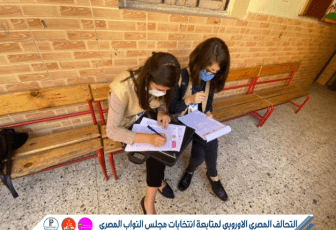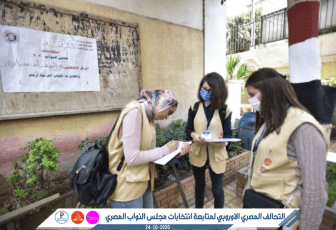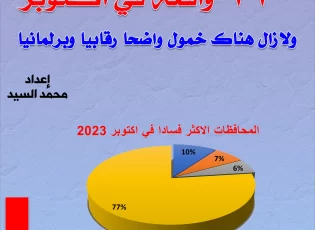Members of the mission monitor the conduct of elections in 38 election headquarters in 3 governorates
The mission monitors citizens' commitment to preventive safety measures and women's turnout in the first hours of voting
The work of the joint Egyptian-European mission to follow up on the 2020 parliamentary elections began on Saturday morning, October 24.
This comes within the framework of the work of the Egyptian-European coalition interested in following up the parliamentary elections in Egypt because of the importance it represents at the international level, and in light of the Egyptian laws governing the electoral process and commitment to international standards, after obtaining the necessary permits from the National Elections Authority.
The mission formed 6 field teams that moved in several separate governorates to monitor the conduct of the electoral process in various Egyptian social and cultural places and levels.
It also monitored the atmosphere related to the electoral process in terms of adherence to the laws issued, which are the Law on the Exercise of Political Rights, the Law on Division of Districts and the Parliament Law of 2020, as well as commitment to the decisions of the National Elections Commission, which is the body entrusted with managing and supervising the electoral process from the start of running for elections last September until the announcement of results The finalists will be on November 30 for the first stage and on December 14 for the second stage.
The members of the mission visited 38 electoral headquarters in the governorates of Fayoum, Beheira and Giza to follow up the progress of the electoral process and monitor the behavior of voters and election officials.
Giza
The voting bloc of Giza governorate is 5 million 690 thousand electoral votes in 1160 electoral sub-committees.
It includes 12 electoral districts for which 480 schools are equipped as electoral headquarters, with 25 seats in the single system and 23 seats in the list system.
Giza governorate also participates in the list of the North, Central and South Upper Egypt sectors, and 23 out of a total of 42 seats are allocated for the entire list, with two electoral lists competing for them.
While 12 electoral districts are competing for the individual seats, 317 candidates representing 36 political parties and independents are competing.
Beheira Governorate
The voting block for Beheira Governorate has 4 million voters and contains 1296 electoral sub-committees, in 9 single-system districts.
214 candidates representing political parties and independents are competing in it to choose only 18 deputies, who are the governorate's share under the dome of the House of Representatives through the individual system.
Al-Buhaira governorate also participates in the West Delta sector list, and 20 seats out of a total of 42 seats are allocated for the entire list, with two electoral lists competing for them.
Fayoum Governorate
The voting bloc for Fayoum governorate is 2 million and 10 thousand voters, for which 75 subcommittees have been allocated.
The governorate consists of 4 electoral districts with 10 seats allocated for the single system, with 80 candidates from different political affiliations competing against them.
Whereas, the Fayoum governorate's share of the North, Central and Southern Upper Egypt sector list is 9 seats, with two electoral lists competing.
Observations of the Egyptian European Mission on the first day of elections
The delegates of the Egyptian European Mission monitored the increase in the turnout in the selected governorate in the first hours of the polling opening, with the decline in attendance at midday, and then the rate began to increase again in the last hours of voting.
They also monitored the commitment of all committees to start voting on the specified date, while the candidates' representatives were keen to remain silent within the electoral commission.
It was noticed that some committees were devoid of a fabric curtain dedicated to the place where the voter would vote.
The length of time the voter cast his vote at the polling station to vote on two cards, one for the individual system and the other for the list system.
Most candidates' supporters adhere to propaganda silence inside and outside the electoral commissions.
The impartiality of the executive bodies in the electoral process, along with the heavy security presence to prevent any problems that might disrupt the electoral process.
The existence of a state of cooperation between the voters and those in charge of the process.
Women and youth turnout to vote from the first hours of the opening of the electoral commissions.
The first stage of the House of Representatives elections includes 14 governorates, and they are:
Giza, Beni Suef, Fayoum, Beheira, Assiut, Matrouh, Minya, New Valley, Red Sea, Alexandria, Sohag, Qena, Luxor and Aswan.
The first phase of the elections includes 10 thousand and 240 electoral sub-committees, while 33 million voters are entitled to cast their votes on polling days.
In the first phase of the elections, 1879 candidates are competing in 143 electoral districts spread over 14 governorates, to choose 284 deputies, 25% of whom are reserved for women.
The closed list elections for the first phase consist of two sectors:
The first sector, the North, Central and Southern Upper Egypt sector, represents 100 seats for which 200 candidates are competing, through two electoral lists.
The second sector, West Delta, represents 42 seats, with 84 candidates competing against them across two lists.












